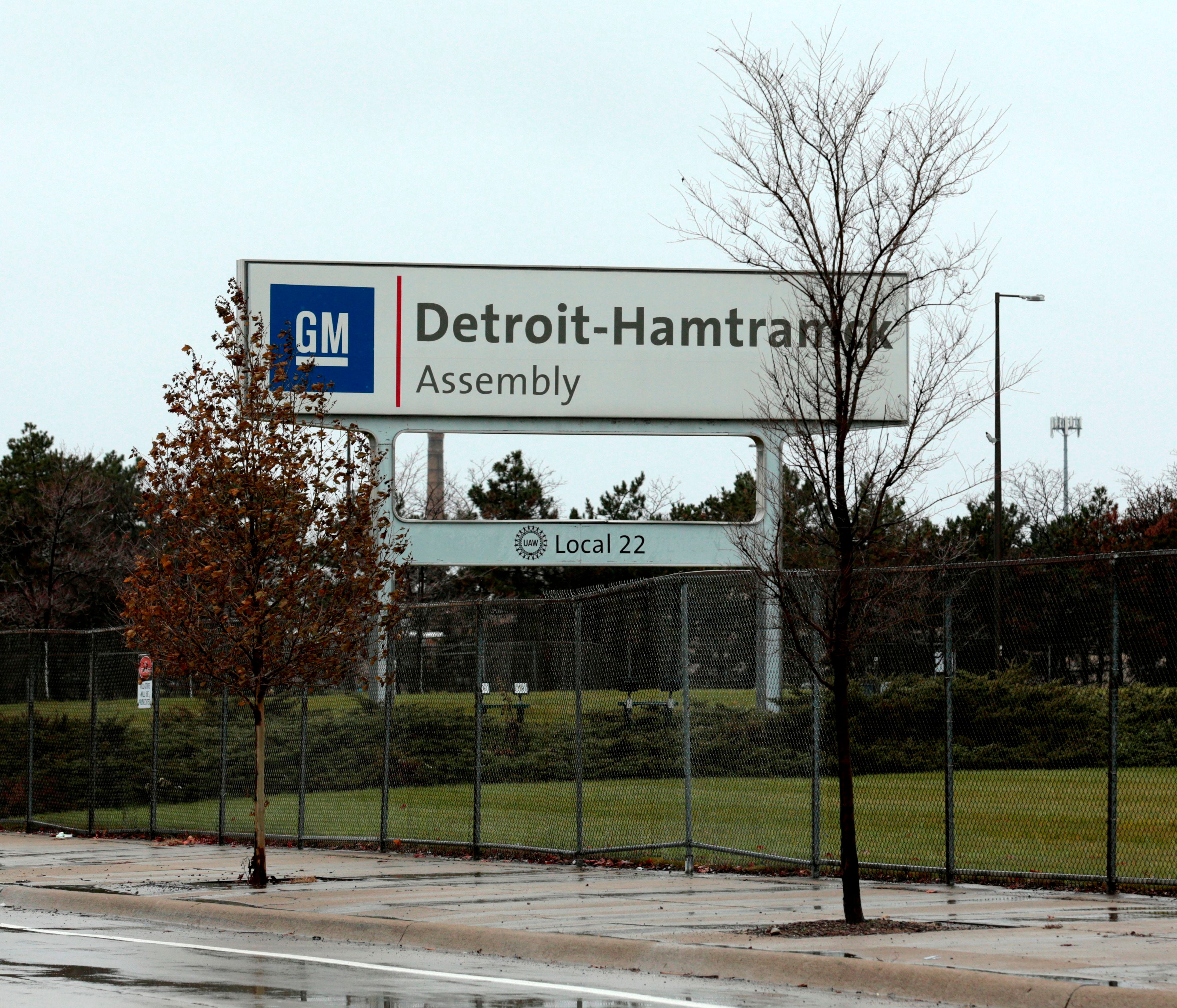GM to idle 5 plants, cut 6K salaried jobs

General Motors Co.'s restructuring efforts in 2019 will hit the Detroit automaker's backyard, with two of five plants to be idled in Metro Detroit, a third in Ohio and layoffs for nearly 6,000 salaried workers in North America.
The idled plants and buyouts and layoffs among salaried workers will affect 14,300 jobs across the company.
That's not sitting well with President Donald Trump, whose bid for the White House was propelled by voters in the industrial heartland. He said Monday he believes GM's decision "has nothing to do with tariffs" imposed by his administration on China and the European Union.
The plants that will cease production next year are Detroit-Hamtramck, Warren Transmission, Lordstown Assembly in Ohio, Oshawa Assembly in Ontario and Baltimore Operations in Maryland. Work will stop, but plants will not officially close. The future of those facilities will be determined during 2019 negotiations with the United Auto Workers.

GM also will lay off nearly 6,000 salaried workers next year after a buyout program last month only had 2,250 takers, according to a memo sent to employees by CEO Mary Barra and obtained by The Detroit News. The salaried buyouts and the layoffs together will affect 8,000 North American employees and a number of global executives, none of whom are part of the senior leadership team.
The idling of five plants will affect some 6,300 workers globally, including 3,300 in the U.S. GM will indefinitely lay off these workers, who will be given the opportunity to transfer to GM's growth plants. All five of the affected plants are considered "unallocated," which means that at this time these plants don't have a product.
This latest restructuring move by GM — which the automaker says will save the company $6 billion by 2020 — comes as the automotive industry faces rising commodity costs due to tariffs and uncertainty surrounding the North American Free Trade Agreement and trade with China.
Trump said he and GM CEO Mary Barra spoke Sunday to discuss the automaker's plans. “Well, we don’t like it,” he said before he departing for a campaign trip to Mississippi. “I believe they’ll be opening up something else. I was very tough. I spoke to her when I heard they were closing and I said this country has done a lot for General Motors, you better get back in there soon. That’s Ohio and you better get back in there soon. So we have a lot of pressure on them.”
GM says it "remains committed to manufacturing in Ohio." The automaker says it employs 4,000 workers in the state in addition to the Lordstown plant. GM has operations in Defiance, Moraine, Parma, Toledo, Warren and West Chester.
GM's stock was up 4.8 percent to $37.65 at close Monday, a day when the Dow and S&P 500 were up about 1.5 percent.

UAW blowback
Monday's announcement was met with sharp criticism from the UAW, with the union's vice president of the GM department Terry Dittes calling it a "callous decision."
“GM’s production decisions, in light of employee concessions during the economic downturn and a taxpayer bailout from bankruptcy, puts profits before the working families of this country whose personal sacrifices stood with GM during those dark days," Dittes said in a statement. "These decisions are a slap in the face to the memory and recall of that historical American made bailout.”
Detroit Mayor Mike Duggan said he will work with the UAW to fight back against GM’s decision to idle the Detroit-Hamtramck plant.
“I reminded (Barra) that we moved thousands of people out of that neighborhood. Hundreds of businesses, six churches … to create that assembly plant,” he said. “We’re not giving up … We’re going to come back hard and we’re going to try to convince them that a modern plant in an area where you can get a good workforce is massive.”
The Detroit Hamtramck Assembly Plant stands on more than 360 acres straddling the Detroit-Hamtramck border in part of a Detroit neighborhood once home to a large Polish community. In the early 1980s, the City of Detroit and State of Michigan used eminent domain laws to force out thousands of residents from the neighborhood and demolish homes, businesses, churches and an old Dodge factory there to build the new plant that would build cars to compete with new foreign competitors. The new plant opened in 1985.
Production for the Buick LaCrosse and Chevrolet Volt at Detroit-Hamtramck ends March 1, with the lines for the Cadillac CT6 and Chevrolet Impala coming to a halt June 1. Lordstown production of the Chevrolet Cruze ends March 1.
Warren Transmission will cease production on Aug. 1 and Baltimore Operations will shutter on April 1. The shutdown at the Oshawa plant isn't finalized yet, but it's expected to stop work in the fourth quarter of 2019.
GM said the plants ceasing production in 2019 will also signal the end of the products made there.
Oshawa is the only plant building the Cadillac XTS sedan. Detroit-Hamtramck and Oshawa are the only plants building the Chevy Impala. Detroit-Hamtramck is the only producer of the Cadillac CT6, Chevy Volt and Buick LaCrosse as well. Lordstown only makes the Chevy Cruze sedan; the hatchback model is made in Mexico.

Economic impact
With the futures of the Detroit-Hamtramck and Warren Transmission plants uncertain, Patrick Anderson, CEO of the East Lansing-based Anderson Economic Group, a business consulting firm that works in the automotive industry, said Southeast Michigan could soon feel the repercussions, as workers cut back on holiday spending because of the potential for layoffs.
“It’s going to be a decline in a number of high-paid jobs in southeast Michigan in our cornerstone industry,” he said. “Auto executives will do anything to avoid the disaster that befell them a decade ago. Mary Barra is doing the right thing by getting in front of the downturn and not bringing the employees, executives and shareholders into a collision that could spell disaster.
“Fortunately, right now the job market is very strong, and I’m convinced a vast majority of the affected employees will be able to find new jobs.”
Hamtramck Mayor Karen Majewski said few Hamtramck residents work in the plant that straddles the line between it and Detroit. But she said it will hurt the city financially as well as culturally.
“The reaction that I’m seeing through social media is pretty much shock around the community,” Majewski said. “Most of us have no direct connection as we did with Dodge Main (which closed in 1979), but it’s still a big economic blow. It’s a blow to the psyche of Hamtramck. Although Hamtramck isn’t dependent on the GM plant as we were on Dodge Main, the automotive is still a powerful part of our historical identity. That’s a concern for us as well as the financial impact.”
The closure of the Detroit-Hamtramck plant marks the final semblance of an automotive plant in Hamtramck after American Axle & Manufacturing closed in 2012. The GM factory employs 1,348 hourly and 194 salaried workers. In 2017, according to city records, it contributed $220,475 in taxes to Detroit.
In Warren, the jobs impact is less severe. The transmission plant employs 265 hourly and 70 salaried workers. But in 2017, the more than 2-million-square-foot property with about 50 buildings contributed $304,298 in taxes, according to city records.
Warren Mayor Jim Fouts said while he is disappointed to lose the 335 jobs in Warren, the outlook for the community is positive. He cited the automaker moving 3,000 jobs from Pontiac to Warren; its plans to invest more than $1 billion into the Warren Technical Center; and the relocation of the Cadillac worldwide headquarters to the former Campbell Ewald building.
“Overall, it’s good news,” Fouts said. “The tech center is going to be at capacity with the transfer with around 26,000 employees. They’ve never had that many people there.”
Act now
GM's plans to save $6 billion in 2019 — which includes $4.5 billion in cost reductions and a lower annual capital expenditure of $1.5 billion — builds on GM's previous cost-cutting effort begun in 2015. The automaker has taken steps to cut $6.5 billion since then, with efforts like exiting the European market.
"We are taking these actions now while the economy and company are strong," Barra told reporters after the announcement Monday. Barra said GM is focused on adapting to a "fast-changing industry with fast changing market conditions."
"We hope you see management team is committed to acting with a sense of urgency," she said.
GM's cost-cutting effort will lead to more investments in autonomous and electric vehicles, Barra said. That will include continued hiring at GM Cruise LLC, the company's autonomous vehicle development arm based in San Francisco.
"You will see a greater share invested in autonomous and electric vehicles," Barra said. Those investments will be seen in engineering budgets and in new global products.
"This industry is changing rapidly (and) we want to make sure we are well-positioned" for the future, Barra said. "This is about making sure GM is lean and agile and getting in front of and leading in autonomous and electric vehicles."
nnaughton@detroitnews.com
Twitter: @NoraNaughton
Staff Writers Ian Thibodeau and Christine Ferretti contributed.